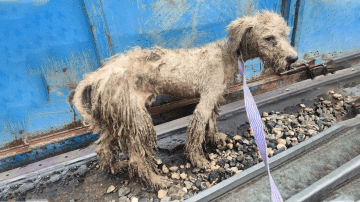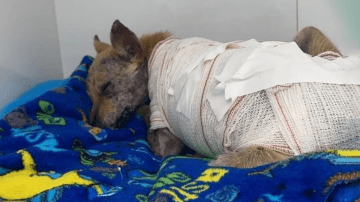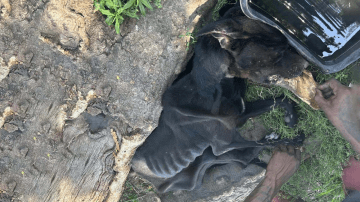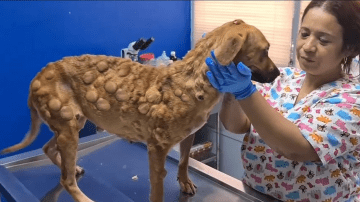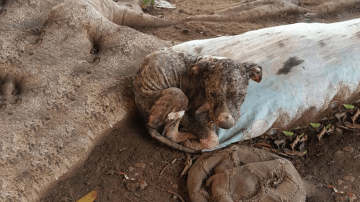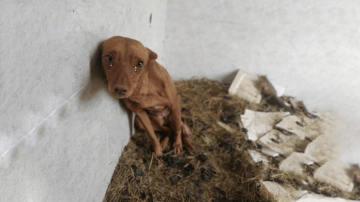Her leg was twisted in a way no leg should ever be, bent and mangled beyond use. Yet despite the obvious pain, she moved with quiet desperation, digging through a filthy pile of garbage. The rain poured down in sheets, soaking her frail body, and still she searched—nose buried in plastic bags, teeth tearing into scraps of waste in the hope of finding something edible.

The sight was unbearable. She looked so small, so broken, as if life itself had already given up on her. Every bone in her body showed through her dirty, wet fur, her ribs stretching taut against her thin frame. Her eyes carried the hollow look of a soul who had survived too many storms alone. It was the rainy season, and no one knew how many nights she had endured like this, trembling in the cold, hiding from thunder, waiting for dawn without shelter, without comfort, without a single hand to help.
A kind woman happened upon her by chance. She saw the trembling little figure in the trash heap, her heart breaking at the sight. With a voice shaking, she called us, explaining where the dog lay. We followed her directions, and there, exactly where she said, we found the fragile animal, half-buried in a mountain of refuse.

When she noticed us, she froze. She didn’t try to run—she was far too weak. She didn’t bark or growl—perhaps she didn’t have the strength, or perhaps she had learned that it never mattered. She only stared, as if asking a question with those sad eyes: would we hurt her too?
Her name was not yet known, but her suffering spoke louder than words. Her right hind leg dragged behind her, twisted and useless. Her body was nothing but skin and bones, shaking either from the cold, the pain, the terror, or maybe all three combined. She had clearly lived this way for a long time, scavenging through garbage during storms, searching desperately for scraps that might keep her alive another day.
We placed a packet of wet food in front of her. For a moment, she hesitated, wary of this sudden kindness. Then, as hunger overcame fear, she inched forward and devoured every bite as though it were her last meal on earth. Watching her eat broke our hearts and filled us with determination. She deserved more than garbage. She deserved a miracle. And so, we gave her a name: Mira.

But a name could not fix the damage her body had endured. Mira’s hind leg was beyond saving. Her fur was patchy, tangled, and riddled with parasites. Fleas and ticks crawled across her skin, and the smell of rot clung to her body. She looked more like a shadow than a dog. Yet through it all, her soul remained gentle. Not once did she snap, growl, or bark. Despite every reason to hate the world, she chose quiet acceptance. How could a creature who had known nothing but neglect still carry such grace? Was her deformity the reason someone had abandoned her, deciding she wasn’t worth keeping?
When Mira finished her food, she tried to limp away, unaware that she didn’t need to run anymore. Her wandering days were over, though she couldn’t yet understand. Hunger still drove her, so she turned back toward the garbage heap, searching for more scraps. That was when we gently lifted her up. She didn’t resist, too tired to fight, and maybe—just maybe—she felt the faintest hint of safety in our arms.
We brought her home. The first thing we did was wipe away the mud and rain that clung to her thin body. Mira relaxed almost instantly, leaning into the towel as though it was the first warmth she had known in forever. We gave her another meal, this one warm and soft, filled with the love she had been denied for so long. Her body still trembled, but her eyes softened. It was the beginning of trust.
Her mangled leg dragged behind her with every movement. Pain must have followed her with each step, yet she never complained. Her body bore the scars of long neglect—skin shriveled, fur falling away, bones jutting out at sharp angles. She needed nutrition desperately, so we gave her high-protein food and vitamins. Slowly, her belly began to fill, and a faint sparkle returned to her eyes.

The next step was harder. Her fur was filthy, crawling with fleas and ticks. The smell of rot clung to her so strongly that it seemed to whisper her suffering. We knew we had to shave it all off, to remove the years of neglect that weighed on her fragile frame. As the clippers hummed, tufts of matted hair fell away, revealing the frail body beneath. Fleas scattered, ticks dropped to the floor, and we saw every inch of the pain she had carried in silence.
After shaving, we gave her a medicated bath. Mira trembled throughout, not out of defiance but fear. The water ran off dark and murky, carrying away dirt, parasites, and sadness. We rinsed her again and again until the water finally cleared. When she was lifted out and dried with a soft towel, she looked cleaner, calmer, almost like a new dog.
Her journey to healing had only begun. We gave her deworming medicine mixed into her food, along with supplements to help her gain weight. She accepted it all without hesitation, as if trusting that whatever we offered could only make her feel better. She sniffed at a dental chew curiously, perhaps the first she had ever seen, before finally taking it in her mouth. Every meal became a celebration, every wag of her tail a victory.
At the rescue home, she was never alone. Volunteers sat with her, cheered for every step she took, no matter how wobbly. Other rescued dogs welcomed her gently, teaching her what it meant to be part of a family. For the first time in her life, Mira was safe—completely and unconditionally safe.
Weeks passed, and Mira began to change. Her skin started to heal under medication. Her skeletal frame filled out as she gained weight. Her once-hollow eyes began to sparkle with gratitude. At night, she slept peacefully, no longer curled against the cold or trembling from fear. She had a name now, a bed, and a promise: this was her home until her forever family found her.
She no longer searched through trash heaps. She no longer scavenged in the rain. Mira had everything she needed—warmth, food, medicine, and above all, love. She finally understood what it meant to be wanted. To be safe. To be cherished.
Her battle was not completely over. Her leg could never be fixed, and her skin still required ongoing care. But Mira no longer faced these challenges alone. She had people who cared for her, friends who played beside her, and a family who promised she would never again know hunger or despair.
Mira was worth saving. Every wag of her tail, every sparkle in her eye proved it. And now she lives the life every dog deserves—a life full of light, warmth, and unconditional love.

